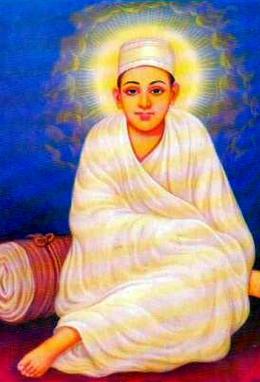Dadu Dayal
Dadu Dayal (1544–1603) was a saint and poet from India, known for his devotional music, poetry, and teachings. His name, Dadu, means "brother", and Dayal means "the compassionate one". He is considered a major figure in the Bhakti movement, which sought to promote the idea that devotion to a personal god is a path to salvation, transcending the caste system and traditional religious practices.
Life[edit | edit source]
Dadu Dayal was born in Ahmedabad, Gujarat, to a family of cotton carders. It is said that he was found by an affluent business man floating on the river Sabarmati, who adopted him. Little is known about his early life, but it is believed that he received spiritual enlightenment at a young age. He spent much of his life in the region of Rajasthan, spreading his message of love, equality, and devotion to God. Dadu gathered around him a group of followers, known as Dadu Panth, who continued his teachings and traditions.
Teachings[edit | edit source]
Dadu Dayal's teachings emphasized the importance of internal worship and the repetition of God's name (Japa). He advocated for a casteless society and preached that all human beings are equal, regardless of their social status or birth. His philosophy can be summarized in the simple principle that the divine is within, and that realization of this divine essence is the goal of human life. Dadu's teachings were compiled by his disciples into a collection of verses known as the Dadu Dayal Ji Ki Bani.
Influence[edit | edit source]
Dadu Dayal's influence extends beyond the spiritual, impacting the social fabric of the regions where his teachings spread. His message of equality and brotherhood contributed to the shaping of a more inclusive society. The Dadu Panth community, which continues to follow his teachings, plays a significant role in the cultural and religious life of Rajasthan. Dadu Dayal is also revered in the Sikh tradition, with some of his verses included in the Guru Granth Sahib, the holy scripture of Sikhism.
Legacy[edit | edit source]
Dadu Dayal's legacy is preserved in the songs, poems, and sayings attributed to him, which continue to inspire devotion and a sense of unity among his followers. Annual gatherings and festivals are held in his honor, particularly in Naraina, in Rajasthan, where his samadhi (tomb) is located. His teachings, emphasizing love, compassion, and the inner journey towards enlightenment, remain relevant in contemporary discussions on spirituality and social harmony.
Search WikiMD
Ad.Tired of being Overweight? Try W8MD's physician weight loss program.
Semaglutide (Ozempic / Wegovy and Tirzepatide (Mounjaro / Zepbound) available.
Advertise on WikiMD
|
WikiMD's Wellness Encyclopedia |
| Let Food Be Thy Medicine Medicine Thy Food - Hippocrates |
Translate this page: - East Asian
中文,
日本,
한국어,
South Asian
हिन्दी,
தமிழ்,
తెలుగు,
Urdu,
ಕನ್ನಡ,
Southeast Asian
Indonesian,
Vietnamese,
Thai,
မြန်မာဘာသာ,
বাংলা
European
español,
Deutsch,
français,
Greek,
português do Brasil,
polski,
română,
русский,
Nederlands,
norsk,
svenska,
suomi,
Italian
Middle Eastern & African
عربى,
Turkish,
Persian,
Hebrew,
Afrikaans,
isiZulu,
Kiswahili,
Other
Bulgarian,
Hungarian,
Czech,
Swedish,
മലയാളം,
मराठी,
ਪੰਜਾਬੀ,
ગુજરાતી,
Portuguese,
Ukrainian
Medical Disclaimer: WikiMD is not a substitute for professional medical advice. The information on WikiMD is provided as an information resource only, may be incorrect, outdated or misleading, and is not to be used or relied on for any diagnostic or treatment purposes. Please consult your health care provider before making any healthcare decisions or for guidance about a specific medical condition. WikiMD expressly disclaims responsibility, and shall have no liability, for any damages, loss, injury, or liability whatsoever suffered as a result of your reliance on the information contained in this site. By visiting this site you agree to the foregoing terms and conditions, which may from time to time be changed or supplemented by WikiMD. If you do not agree to the foregoing terms and conditions, you should not enter or use this site. See full disclaimer.
Credits:Most images are courtesy of Wikimedia commons, and templates, categories Wikipedia, licensed under CC BY SA or similar.
Contributors: Prab R. Tumpati, MD

